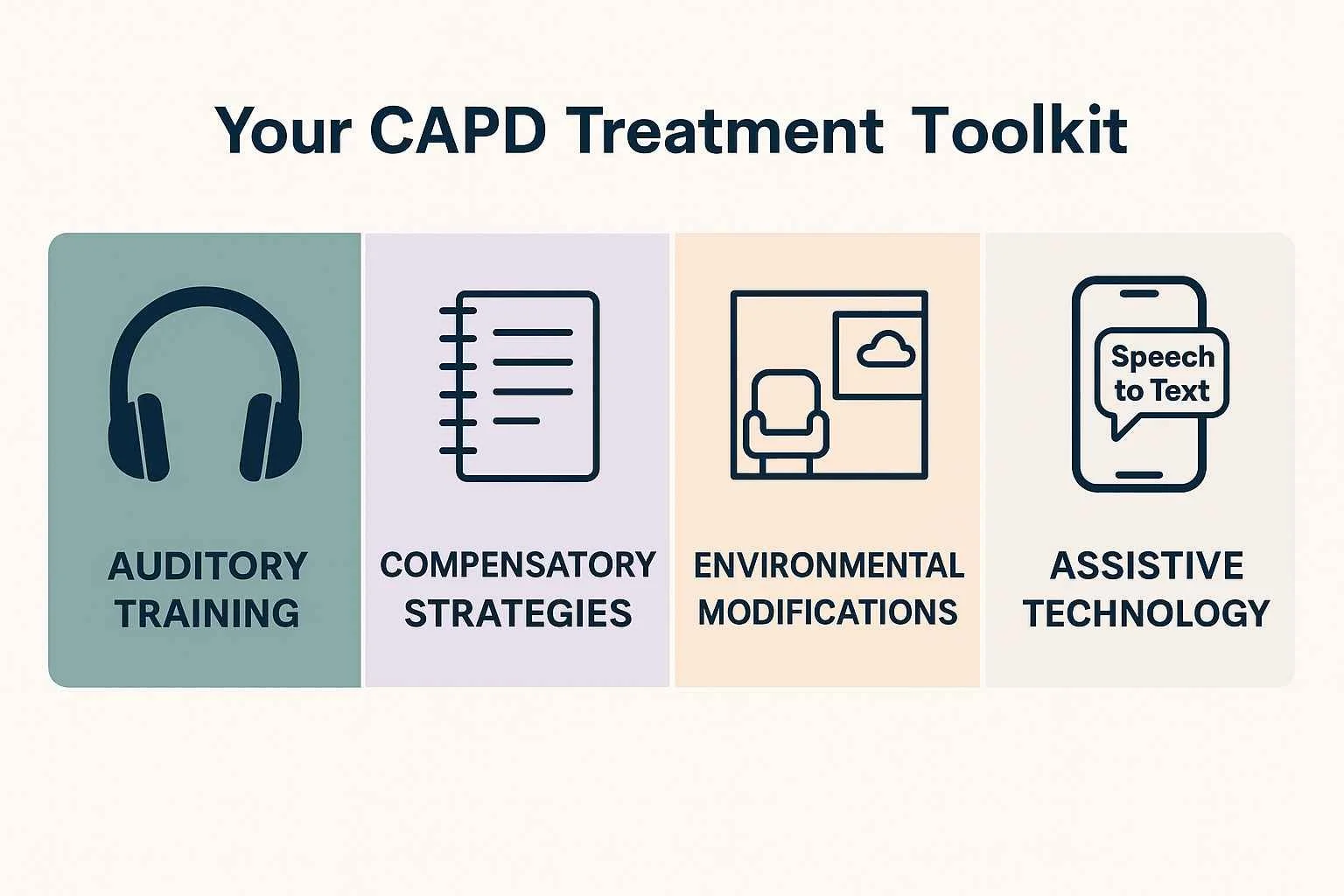Treatment for Central Auditory Processing Disorder in Adults
Central auditory processing disorder (CAPD) affects how the brain interprets sounds, even with normal hearing. Adults with CAPD may struggle to follow conversations, especially in noisy places or group settings.
This can feel frustrating and isolating, leading to stress and misunderstandings. The good news is, effective treatment and support are available to help you manage these challenges and communicate more confidently.
Key Takeaways:
What Is Central Auditory Processing Disorder (CAPD): CAPD affects how the brain processes sound, even when hearing is normal. It often causes difficulty understanding speech, especially in noisy environments.
Diagnosing Auditory Processing Disorder: An audiologist uses specific auditory processing tests to diagnose auditory processing disorder. Speech-language pathologists assist by addressing related communication issues.
Treatment Options for Adults with Auditory Processing Disorder: Treatment for auditory processing disorder includes auditory training, compensatory strategies, environmental adjustments, and assistive technology, all tailored to daily needs.
How Speech Therapy Can Help: Speech-language pathologists help improve auditory processing skills and teach strategies that make everyday communication easier.
What Is Central Auditory Processing Disorder?
How CAPD Affects Daily Life in Adults
Diagnosing Auditory Processing Disorder (APD)
Treatment Options for Adults with CAPD
Coping Strategies for Those with CAPD
What Is Central Auditory Processing Disorder?
Auditory processing disorder (APD), also known as central auditory processing disorder (CAPD), is a condition in which the brain has difficulty understanding sounds, even when hearing is normal. The ears detect sound correctly, but the central auditory nervous system struggles to process auditory information clearly and efficiently.
Adults with auditory processing disorder (APD) often experience difficulty following conversations in noisy environments. Common signs include trouble understanding speech with background noise, following rapid speech, and telling apart similar sounds. Some people also have challenges with auditory memory, discrimination, and other listening skills that support effective communication.
Auditory processing disorder is not caused by hearing loss or a problem in the ear canal. People with APD typically have normal hearing thresholds and pass standard hearing tests. The issue lies in how the brain interprets sound, not in detecting it.
How CAPD Affects Daily Life in Adults
Auditory processing disorder (APD) can make everyday situations feel overwhelming. At work, meetings or phone calls in noisy settings may be hard to follow. In social settings, such as group conversations or busy restaurants, missed cues or confusion can occur. Even simple chats with family might require repeated explanations or clarifications.
These ongoing listening difficulties can lead to emotional fatigue. Many adults with auditory processing disorder experience stress, frustration, or self-doubt. You might feel like you’re not keeping up or that others misunderstand your struggles as a sign of inattention or forgetfulness.
CAPD often goes undiagnosed in adults. Because hearing test results may come back normal, the issue can be mistaken for a hearing problem, cognitive issue, or just a personality trait. Without a proper evaluation of auditory processing skills, the true cause remains hidden.
Auditory Processing Delay in Adults
Check out our blog on auditory processing delay in adults for more information!
Diagnosing Auditory Processing Disorder (APD)
Diagnosing CAPD requires a team approach. An audiologist is the primary specialist who can diagnose auditory processing disorder through a series of auditory processing tests. These may include the frequency pattern test, duration pattern test, and other evaluations that measure how well the brain processes sounds, speech perception, and auditory temporal processing.
Many adults with suspected auditory processing disorder go years without answers, often mistaking their symptoms for ADHD, hearing loss, or cognitive decline. Understanding the root cause helps target the proper auditory processing disorder treatment and reduces the risk of ongoing stress and misunderstanding.
Speech-language pathologists work closely with audiologists during the diagnostic process. While they do not diagnose CAPD, they assess related communication challenges and help develop personalized treatment plans to address these challenges. Their support is key for improving auditory processing skills and building effective coping strategies.
Treatment Options for Adults with CAPD
These treatment options combine targeted exercises, practical tools, and everyday strategies. A customized plan can help strengthen auditory processing skills and reduce frustration in complex listening situations.
Auditory Training
Auditory training uses structured practice to improve how the brain processes auditory signals. Sessions might focus on listening to speech in background noise, distinguishing similar sounds, or improving auditory skills. These exercises support the brain’s ability to process auditory information more accurately over time.
Compensatory Strategies
Compensatory strategies help adults manage listening difficulties in the moment. Examples include:
Taking written notes during conversations or meetings
Asking for repetition or clarification without hesitation
Using visual aids like slides or written agendas to reinforce spoken information
These approaches support weak areas without relying only on auditory input.
Environmental Modifications
Small changes to the environment can make a significant difference. Reducing background noise, facing speakers directly, and choosing quiet locations for conversations can improve speech perception. At home or work, adjusting lighting and reducing distractions also helps focus auditory attention.
Assistive Technology
Technology offers extra support for poor auditory processing. Personal FM systems deliver a speaker’s voice directly to the listener, improving clarity in loud environments. Other tools, such as speech-to-text applications or real-time captioning, can make verbal information easier to follow, particularly in group or virtual settings.
Each of these tools and strategies can be combined to develop a treatment plan that works in real-world settings, not just in the clinic.
How Speech Therapy Can Help
Speech therapy plays an important role in treatment for Central Auditory Processing Disorder in adults. A speech-language pathologist (SLP) helps you build practical skills to manage listening difficulties and improve communication in everyday settings.
Speech therapy sessions focus on strengthening specific auditory processing skills. You might work on auditory discrimination, auditory memory, or processing auditory information more efficiently. Sessions may also include auditory closure tasks, listening to verbal stimuli in background noise, and learning coping strategies for complex listening situations.
Progress often shows up in small but meaningful ways. You may start following conversations more easily, asking for repetition less often, or feeling more confident during work meetings or social events. With consistent support, many adults experience real improvements in both auditory function and quality of life.
Speech Therapy for Adults Quiz
Take our quiz to find out if speech therapy is right for you or your loved one.
Coping Strategies for Those with CAPD
Living with CAPD as an adult can be challenging, but there are practical ways to make communication easier. These strategies help reduce daily stress and support a better understanding in complex listening situations.
Start by managing your environment. Choose quiet spaces when possible, and sit close to the speaker during conversations. Using visual aids, such as written notes, slides, or handouts, can reinforce auditory information. At work, asking for agendas or summaries in advance can help you prepare and stay on track.
Build personal strategies that support your strengths. Taking notes, repeating information aloud, or breaking instructions into smaller steps can help support auditory memory and working memory. Don’t hesitate to ask for clarification; clear communication benefits everyone.
Support from others also matters. Friends, family, and coworkers can help by speaking clearly, reducing background noise, and giving you time to process what’s said. When these adjustments become part of your routine, everyday communication feels less overwhelming.
Frequently Asked Questions About CAPD Treatment
1. Are auditory processing disorders curable?
Auditory processing disorders are not curable in the traditional sense, but they are manageable. With proper support, including auditory training and speech therapy, adults can improve their auditory processing skills and learn strategies to handle complex listening situations more effectively. Many people see meaningful progress that improves daily communication.
2. What are the triggers for auditory processing disorder?
Auditory processing disorder can be triggered or worsened by several factors. These include noisy environments, fast or unclear speech, background noise, fatigue, and stress.
In some cases, auditory processing deficits may be linked to neurological disorders, head injuries, or conditions like multiple sclerosis or stroke. CAPD can also appear in adults with autism spectrum disorder or learning difficulties.
3. What therapy is used for auditory processing disorder?
Speech therapy for auditory processing disorder often includes auditory training to strengthen specific listening skills. This might involve exercises that improve auditory discrimination, auditory memory, and auditory temporal processing.
Speech-language pathologists may also teach compensatory strategies and recommend assistive technology, such as personal FM systems or speech-to-text tools. Treatment is personalized based on each person’s auditory processing problems and lifestyle needs.
How Connected Speech Pathology Can Help
Connected Speech Pathology offers specialized support for adults with CAPD. Our licensed speech-language pathologists understand the unique challenges associated with auditory processing deficits and create treatment plans tailored to your daily life.
We begin with a clear understanding of your needs, guided by your history, communication goals, and results from any auditory processing tests you may have undergone. From there, speech therapy focuses on building real-world auditory processing skills through targeted auditory training, coping strategies, and communication support.
Sessions are flexible and held online, making it easier to access help from anywhere. We work with you at your pace.
Whether you're dealing with frequent listening difficulties, struggling to follow conversations in noisy environments, or just tired of feeling misunderstood, our team is here to help you move forward with confidence.
Summary
Improvement is possible at any age. CAPD can create daily challenges, but with the right diagnosis and support, those challenges can be managed.
Auditory training, personalized strategies, and expert guidance from a speech-language pathologist can help you communicate more clearly and confidently.
About the Author
Allison Geller is a communication coach, speech-language pathologist, and founder of Connected Speech Pathology, an international online practice providing professional communication coaching and speech therapy for children, teens, and adults. With more than two decades of experience, she has worked in medical and educational settings, published research on aphasia, and leads a team of specialists helping clients improve skills in public speaking, vocal presence, accent clarity, articulation, language, fluency, and interpersonal communication.












